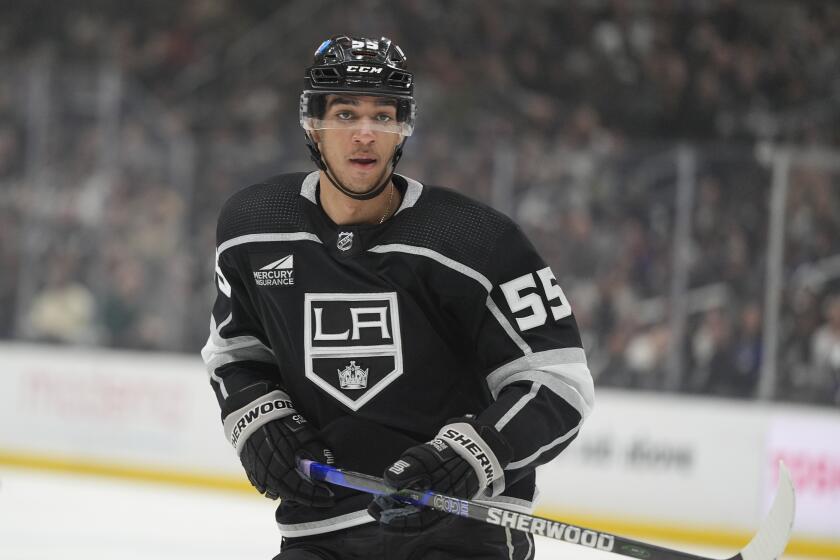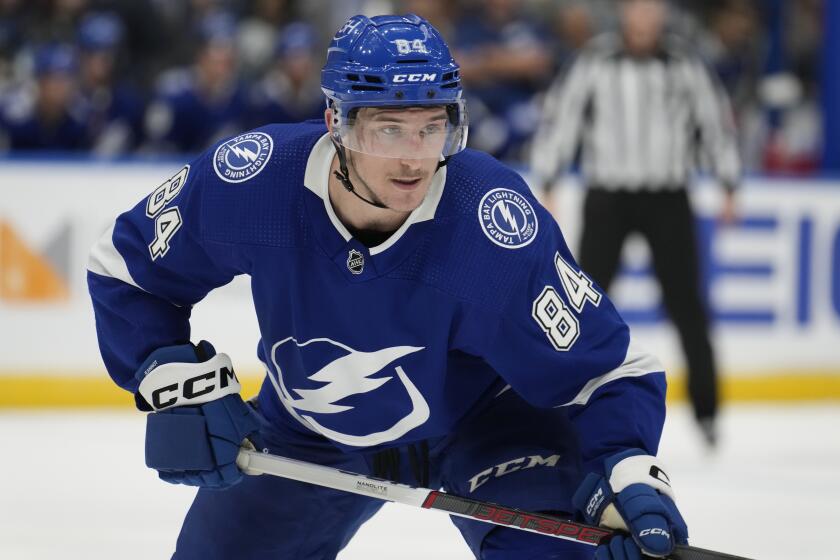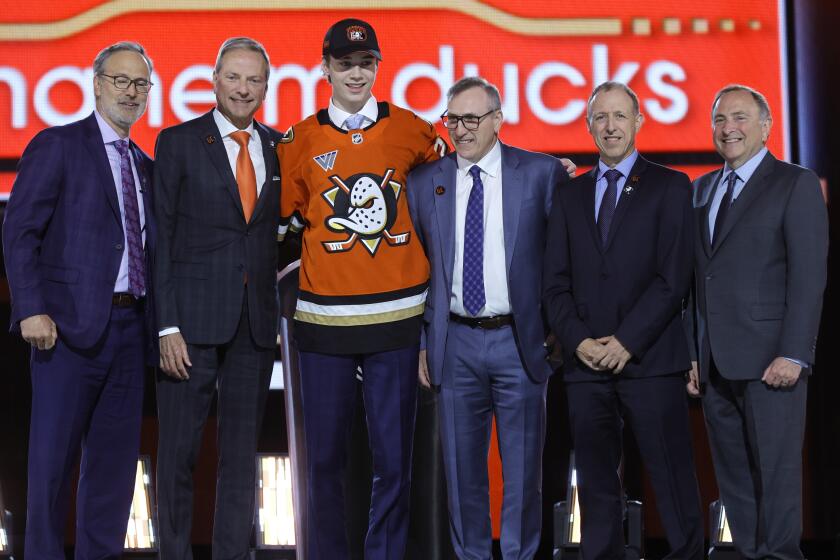Red Square to Red Wings : Fedorov, Fetisov, Konstantinov, Larionov and Kozlov--Just Your Everyday Detroit Lineup
The first shot by New York Ranger center Mark Messier was a hard elbow to Vladimir Konstantinov’s head. Messier then delivered a cross-check to the back of Konstantinov’s neck, driving him to the ice in pain.
But if Messier wanted to challenge Konstantinov, a rugged defenseman who has been known to wield a high stick, he got more than he bargained for. Within moments, Viacheslav Fetisov and Sergei Fedorov rushed over to help defend Konstantinov, their Detroit Red Wing teammate and Russian compatriot.
“We’re going to stick [up] for each other, no question,” Fetisov said. “We play many years against Canadians and they try to do this all the time. I’m not surprised. It’s natural instinct not to back down. . . .
“When I first came to the NHL, it was different. I was almost alone when I came. I didn’t have support from my own teammates.”
It’s rare for Fedorov to fight--the penalty he got against the Rangers was only his second this season. Usually, the support Fedorov, Fetisov, Konstantinov, Igor Larionov and Viacheslav Kozlov give one another is in the form of crisp passes and clever scoring setups.
After acquiring Larionov last month from the San Jose Sharks, the Red Wings became the first team in NHL history to use a five-man unit composed entirely of Russians. To capitalize on Larionov’s superb play-making skills, they moved Fedorov--the NHL’s most valuable player in 1994--from center to right wing and put Kozlov on their left, backed up on defense by Fetisov and Konstantinov. The results have been impressive.
Fedorov, Detroit’s top scorer, has six goals and 18 points in the 12 games since Larionov arrived. Larionov has 12 points, and Kozlov is tied for third on the team with six goals. Since they traded Ray Sheppard for Larionov, the Red Wings are 9-3, and they lead the Central Division.
“It’s been really good,” Detroit Coach Scotty Bowman said of the unit’s performance. “Territorially, they’ve given up very few chances because they always have the puck. They really can cycle it.
“Sometimes you wonder how they get open. I think it’s something they learn when they’re young. Maybe it comes from playing soccer, because they all played soccer there. They move before the puck comes to them, with this great sense of anticipation.”
Said Detroit defenseman Paul Coffey, “Igor’s great ability is to make everybody else around him play better. He’s the closest thing, in body structure and the way he passes the puck, to Wayne Gretzky that I’ve ever seen. Mario [Lemieux] is too tall and Mark [Messier] plays a different [more physical] game. He brings a lot to the team.”
Fetisov, 37, and Larionov, 35, aren’t merely passing the puck to Fedorov and the others. They’re passing the torch to the next generation of Russian stars, a generation that will be the first to reach maturity while playing in the NHL.
All five are graduates of the Russian Red Army team, which supplied many of the top players on the great Soviet national and Olympic teams. Fetisov and Larionov were among the first Russians permitted to play in the NHL, but they couldn’t leave until the Soviet hockey federation decreed they had brought their homeland enough glory.
For Fetisov, who was 31 when he joined the New Jersey Devils, those honors included two Olympic gold medals and one silver. Larionov won two Olympic gold medals centering for Vladimir Krutov and Sergei Makarov on the famed K-L-M line before he was allowed to join the Vancouver Canucks a few months before he turned 30.
Had Larionov arrived in the NHL in his early 20s, Konstantinov said, “He’d maybe be [close in points to] Gretzky, except he wouldn’t score all the goals. But he would have a lot of assists.”
Larionov, however, doesn’t brood about what might have been.
“When I first came over, in ‘89, I said, ‘I’d like to see the young guys in Russia come here and have a chance to play in this league,’ ” he said. “For myself, I have no regrets. I played in a lot of Olympic, World Championships and Canada Cups and I’m just glad I made it to the NHL at the end of my career.”
He was at his peak when Fedorov joined the Red Army team in 1986. That they would be teammates again--let alone linemates--after both left for North America seemed impossible.
“You never imagine these things,” Fedorov said. “But I am glad it happened. It brings lots of pleasure. It’s lots of fun. As you see on the ice, we communicate very well. I just hope we can score a little more often and capitalize on the chances we’ve been getting.”
When those chances turn into goals, even opponents are mesmerized.
“It’s worth a ticket to Joe Louis [Arena] to watch those guys play,” Dallas center Mike Modano said after Kozlov, Larionov and Fedorov had each scored against the Stars. “You put all of them together and there’s a lot of puck control, a lot of patience, a lot of creativity in their game.”
Said Larionov, “It is significant to me that we play together because it is always fun to play with guys who came from the same school. You don’t have to spend much time communicating with anyone else because they play the same game.”
Fetisov considers the performance of the unit a matter of national pride.
“For Igor and myself, it means more than for the other younger players, but we all enjoy to play together,” he said. “We have lots of responsibility because we are getting a lot of attention, a lot of people are asking how are we going to do this and how are we going to survive in this situation. We have to do our best.
“It was the coach’s decision to put us together, and it was the right one. I’m still disappointed we are not scoring more goals. We have lots of scoring chances and we are not capitalizing. Sometimes that hurts the team.”
Coffey agrees that the Russian unit doesn’t always convert the chances it creates, but he deems the experiment a success.
“Sometimes they tend to overpass and not shoot, but all in all they’ve done well,” he said.
“When [Larionov] got traded here, some people were saying, ‘This is becoming Team Russia.’ And at first, we players were a little leery, but as a player, you don’t care what nationality other players are as long as they bring something to the team, and they do. “
Larionov and Fetisov have been mentioned as potential candidates to coach the Russian squad in the 1998 Nagano Olympics, the first that will use a “Dream Team” format. They’re not sure if that will happen, but the thought seems to intrigue them.
“Maybe I’ll play,” Fetisov said, laughing. “It’s going to be my fourth Olympics. I don’t know what the future will hold.”
Said Larionov, “I don’t know who spread that rumor, but it’s a tough job to be a coach. Unless it’s coaching Russian superstars--you just give them the puck and let them play.”
Go beyond the scoreboard
Get the latest on L.A.'s teams in the daily Sports Report newsletter.
You may occasionally receive promotional content from the Los Angeles Times.




